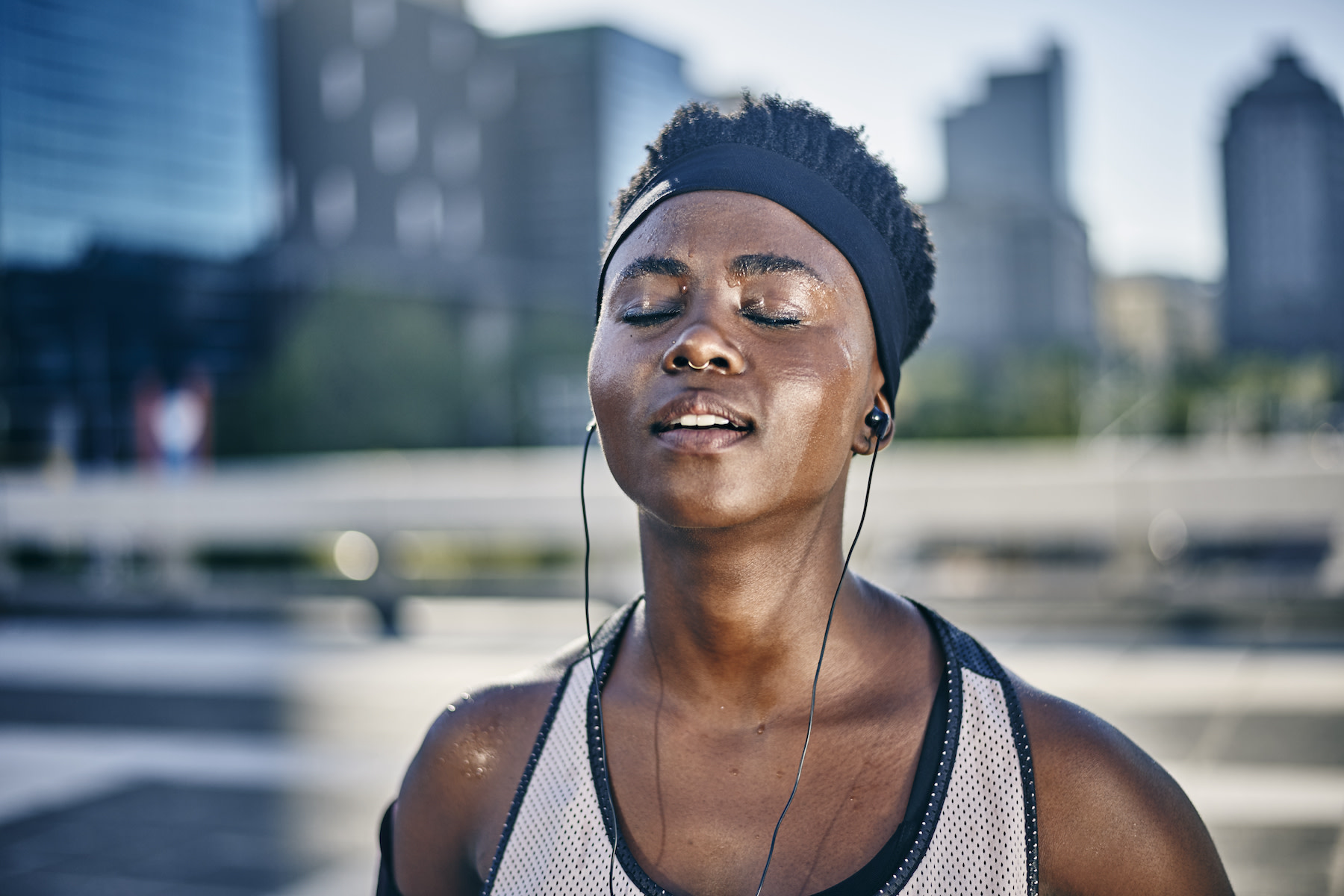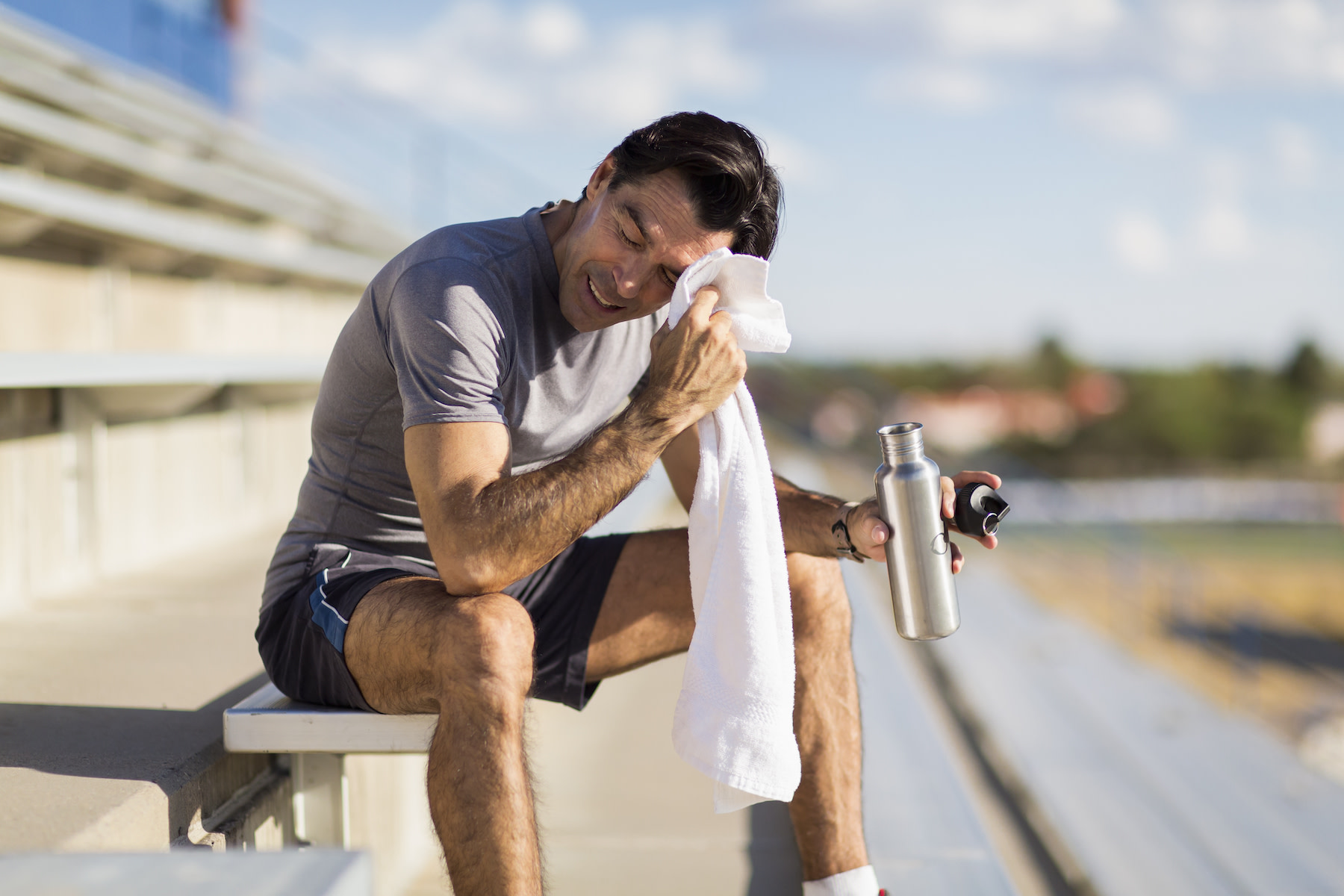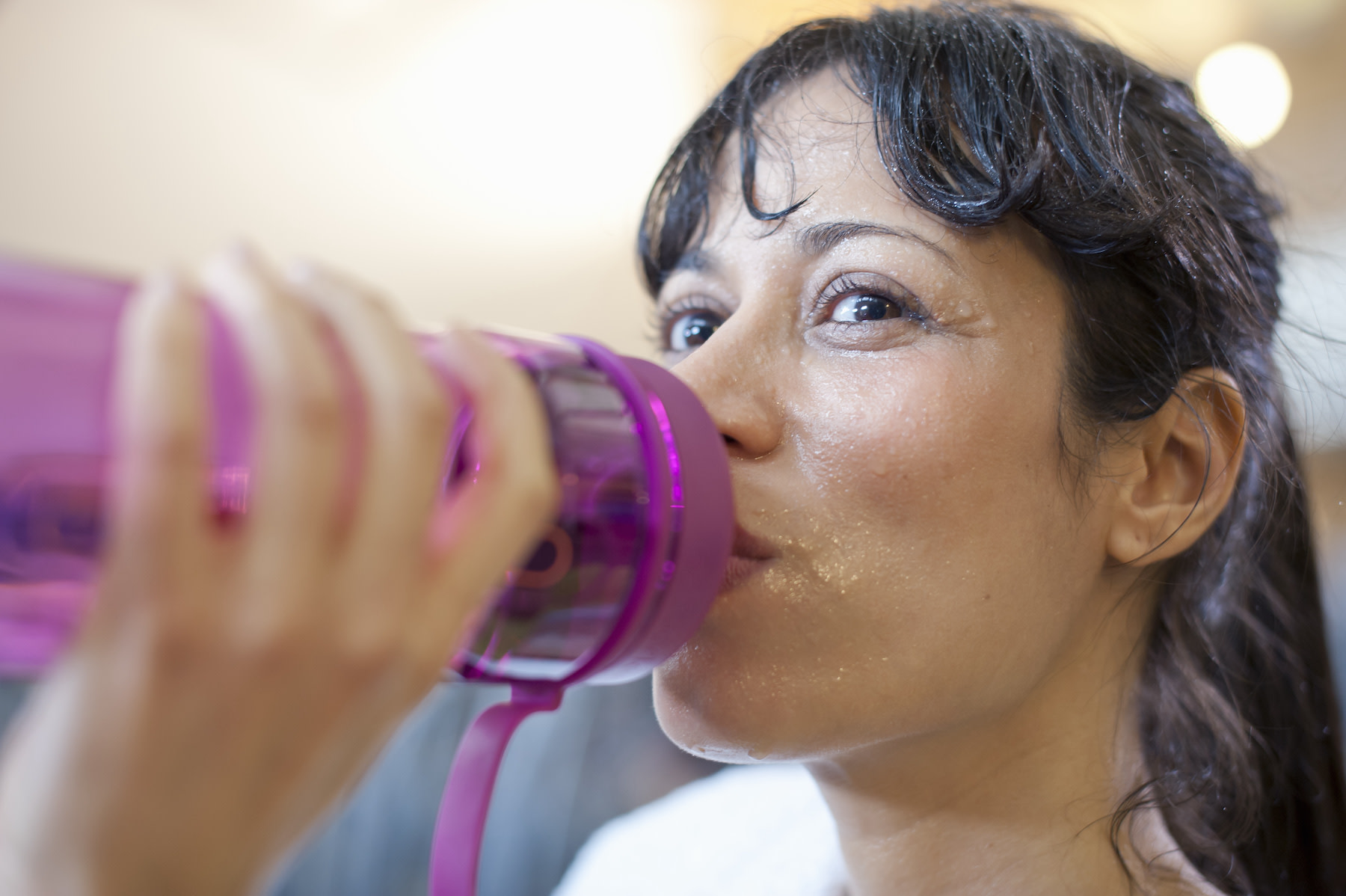
Uwe Krejci / Stone via Getty Images
Always Drenched in Sweat After a Workout? Here's Why It Happens
A dermatologist breaks down the causes behind excess perspiration.
By Michele Ross•
Why Do I Sweat So Much When I Work Out?
The Different Types of Sweating
Is It Good to Sweat While Exercising?
Can I Prevent My Body from Sweating So Much?
The Importance of Hydration When You’re Sweating
What Does It Mean If You’re Barely Sweating at All?
The Takeaway
Picture this: You’re 10 minutes into your go-to vinyasa flow with a friend. Although you’ve only completed a single sun salutation, you can already feel your workout clothes absorbing a sizable amount of sweat. You glance at your friend and see that they’re just as dry as they were before stepping onto the mat. You’re doing the exact same activity with the same amount of effort—so why are you on opposite ends of the sweat spectrum?
It’s more than understandable (and all too relatable) if you find yourself wondering why you sweat so much when you work out. Ahead, you’ll learn all about how to put a damper on… well, dampening. We spoke with board-certified cosmetic dermatologist Michele Green, MD, to get her expert insights on why some people sweat excessively while working out—and if it’s totally normal or cause for concern. Plus: the lowdown on the different types of sweat, how to curb excessive perspiration, and more.
Why Do I Sweat So Much When I Work Out?
Before we (pardon the pun) make a splash into what’s behind your sweat puddles during exercise, let’s first cover a key question: Why do we sweat to begin with?
“During a workout, our heart rate and core body temperature increase,” Dr. Green says. “In response, our body stimulates sweat glands to perspire or produce sweat.” Soon enough, the sweat evaporates from your skin, thus releasing heat and effectively cooling your body down.
Perhaps you sweat a lot while working out, simply living your life, or both. There are a few common reasons why you naturally won’t stay as dry as you’d like—or why you always seem to generate what seems to be infinitely more moisture than your workout buddy does.
According to Dr. Green, key causes of profuse sweating include:
Having overactive sweat glands (whether inherited, due to hormonal fluctuations from puberty or menopause, or on account of certain chronic health conditions)
Living in a larger body, which generates more heat and calls for more sweat to cool down your body
Starting exercise with an elevated body temperature, which can be triggered by digesting spicy foods or a heavy meal shortly before exercising, having or recovering from an illness, and other extenuating factors
Sweating a lot may also point to a medical condition called hyperhidrosis. Dr. Green says this kind of sweating occurs independent of exercise, environmental factors like temperature and humidity, and conditions like stress. “With hyperhidrosis, sweat glands remain in a constant state of overactivity and produce more sweat than necessary to regulate body temperature,” she explains.
People with hyperhidrosis have an oversensitive sympathetic nerve (which regulates sweating), triggering a deluge of sweat. Per the National Library of Medicine, primary hyperhidrosis may involve a genetic factor, but the exact cause isn’t well understood. Meanwhile, secondary hyperhidrosis may develop alongside other medical conditions “including but not limited to thyroid issues, diabetes, menopause, and certain types of cancers,” Dr. Green says.
Personal factors aside, certain workouts can cause you to sweat more than others. Since the body generates sweat in order to help keep you cool, fitness modalities that seriously rev up your core temperature—think HIIT workouts, hot yoga, and the like—can lead you to sweat buckets (versus a droplet here and there).

Marc Romanelli / Tetra Images via Getty Images
The Different Types of Sweating
Did you know that there are actually three types of sweat? How about the fact that there are two types of sweat glands: eccrine glands and apocrine glands? If you need an intro lesson or a quick refresher, Dr. Green helpfully outlines key details below.
1. Thermoregulatory Sweating
Thermoregulatory sweating—i.e., the type most commonly at play while working out—cools the body to maintain a healthy core body temperature thanks to eccrine glands. “Thermoregulatory sweating typically originates around the scalp and forehead before moving to the face and rest of the body,” Dr. Green shares. Such areas include but aren’t limited to the chest, underarms, and back.
2. Emotional Sweating
Emotional sweating (aka psychological sweating) occurs in response to stimuli like stress, fear, and pain. “Eccrine glands are also stimulated during emotional stress, with sweat typically developing in the palms, axillae [aka underarms], and soles,” Dr. Green says. Apocrine glands, which “can be found in the perianal and axilla regions and are commonly associated with more odorous sweat,” are involved in emotional sweating as well. That’s because these glands are stimulated by norepinephrine, a hormone that gets released in response to stress, she explains.
3. Gustatory Sweating
Gustatory sweating occurs in response to digesting hot or spicy foods. (Fun fact: Even the mere thought of spicy foods can trigger the sweat glands to activate.) Gustatory sweating is common on the face and neck, notes the International Hyperhidrosis Society.
Is It Good to Sweat While Exercising?
Rest assured that sweating isn’t just natural; it’s good for you and beneficial for your physical fitness regimen. While you’re exercising, the primary purpose of sweat is to regulate your body temperature. Heat gets released and your body is able to cool down so you can safely and comfortably continue with your workout.
When Sweat Becomes Excessive During a Workout
Sweating during exercise typically indicates that your body is doing exactly what it should. But in some cases, extreme sweating can signal that you’re losing fluids and electrolytes at a rapid rate, thus running the risk of dehydration and electrolyte imbalance. (Stay tuned, as we’ll later cover the key symptoms to watch out for, as well as tips to keep your fluid and electrolyte counts in good shape.)
If you sweat profusely during a workout—or even from mild activity—you might be dealing with hyperhidrosis, which warrants medical attention.
Can I Prevent My Body from Sweating So Much?
Although sweating is natural, it can sometimes feel embarrassing—especially if you’re visibly drenched through your clothes and a perceptible odor develops alongside the moisture. (Side note: Sweat and stench, though often paired together, aren’t one and the same. In fact, as a 2018 study in the journal Microbiome summarizes, the former is actually odorless while the latter results from bacterial growth and decomposition of odor precursors within the apocrine glands.)
To get ahead of intense sweat—and perhaps even potential stink—during a workout, you can:
Apply antiperspirant shortly before exercising (and reapplying as needed)
Invest in breathable, sweat-wicking workout clothes
Avoid eating spicy or large meals before exercising
Wait to exercise until you’ve fully recovered from a fever
Plan to move your body at cooler times of the day and/or when you’re shielded from the sun
Cool down the temperature of your environment when possible, such as by turning on a fan or the AC
Treatments for Excessive Sweating
Heeded all of the dietary and lifestyle interventions above and still can’t seem to stop the sweating? It may be time to seek medical advice, which you definitely shouldn’t hesitate to get a move on. “If left untreated, excessive sweating can cause maceration, or skin breakdown, leading to susceptibility to infection,” Dr. Green warns. “Consulting with a doctor is [ideal] to determine the best treatment for you.” Fortunately, a variety of medical treatments are available that can curb intense sweating with success.
To start, you can talk to your doctor about prescription antiperspirants. Look for those that contain active ingredients such as aluminum chloride, aluminum chlorohydrate, and aluminum zirconium. According to Dr. Green, these ingredients form a gel with sweat to block the production of more sweat.
Next up on the list is anticholinergic medications, which block neurotransmitters called acetylcholine from transmitting signals between specific cells to decrease sweat production, Dr. Green explains. Topical anticholinergics block the receptors responsible for excessive sweating, while oral anticholinergics can be used off-label to decrease your overall sweating, she says.
Last but not least, you can consider Botox—yep, Botox—which gets Dr. Green’s enthusiastic stamp of approval for its efficacy to halt excessive sweating. “Botox contains botulinum toxin, a neurotoxin that inhibits nerves from signaling sweat glands, leading to a decrease in sweat production,” she explains. Your derm can inject it into your underarms, palms, and/or feet. Just note that it’s not a permanent solution.
“Botox injections are temporary and can last six to 12 months, depending on the injection area and the body's metabolism,” Dr. Green continues. You should also anticipate paying for the treatment out-of-pocket, as it’s typically not covered by insurance. Nonetheless, it’s highly effective, so chat with your doctor about whether or not it could be a worthwhile option for you.
As always, it’s important to start by talking with your doctor about which (if any) of these approaches might be right for you.

yellowdog / Image Source via Getty Images
The Importance of Hydration When You’re Sweating
Again, staying hydrated is crucial—full stop. This rings true day in and day out, whether you’re logging a workout or not. No matter the cause, if you sweat a lot, you may run the risk of dehydration and electrolyte loss if you don’t stay on top of replenishment.
Per Cedars-Sinai, you’ll want to watch out for dehydration symptoms including but not limited to:
Thirst
Dry mouth
Dizziness
Confusion
Headaches
Rapid breathing and/or heart rate
Muscle cramps
Dark yellow (or even light brown) urine
To avoid these symptoms, be sure to drink H2O throughout the day—especially on days when you work out. (Bonus: Other beverages, as well as water-rich foods like produce and soups, also count towards your daily quota.)
If and when you’re physically active, you should also take care to replenish your electrolytes. Per a 2020 Nutrients review, some of the top dietary sources of electrolytes include:
Fruits and veggies
Whole grains
Dairy products like milk and cheese
Meat
Fish
Mineral water
What Does It Mean If You’re Barely Sweating at All?
Thus far, we’ve covered the ins and outs of sweating to extremes. But what about the opposite end of the spectrum: not sweating at all or sweating only to a limited degree when it’s totally normal, expected, and healthy to sweat? (Think: If you’ve logged an hour on the Tread and there’s nary a bead of sweat in sight.)
According to Dr. Green, you could be dealing with a condition called hypohidrosis. At first, you might think this would be a welcome substitute for sweating profusely—after all, many of us default to thinking the grass is always greener on the other side. However, lacking the ability to sweat isn’t without its risks.
“Hypohidrosis, or anhidrosis, is a medical condition where sweat glands have trouble producing sweat in one or more body areas,” Dr. Green explains. Mild cases may be barely perceptible, yet severe cases can end up being life-threatening, she cautions.
“Sweat is essential for cooling body temperature in situations, such as hot weather or physical activity,” Dr. Green reminds us. “Failure of the body to produce sweat in these situations can lead to heat cramps, heat exhaustion, and heatstroke.” Just as hyperhidrosis warrants medical intervention, so does hypohidrosis. Be sure to get ahead of either to keep your workouts and your body on track.
The Takeaway
Always questioned why you sweat so much when you work out? The root cause might be due to your genetics, having overactive sweat glands, your body’s size and temperature, or certain medical conditions. Moreover, a few lifestyle factors—and even your specific fitness modality of choice—could be causing you to heat up more than you would on a different day (and during a different workout).
That said, there are a few easy-to-adopt solutions that may help you feel less sweaty during a workout. Perhaps the hack that works for you is as simple as wearing the right workout clothes or adjusting your pre-exercise food intake. Otherwise, you might want to pay a visit to your doctor to discuss whether or not medical interventions—like an Rx antiperspirant or Botox injections—could help stop excessive sweating. By following these tips, you can very well succeed in your quest to stay more dry, and once and for all swap your main focus from wetness to your workout.
This content is for informational and educational purposes only and does not constitute individualized advice. It is not intended to replace professional medical evaluation, diagnosis, or treatment. Seek the advice of your physician for questions you may have regarding your health or a medical condition. If you are having a medical emergency, call your physician or 911 immediately.
Level up your inbox.
Subscribe for a weekly dose of fitness, plus the latest promos, launches, and events.